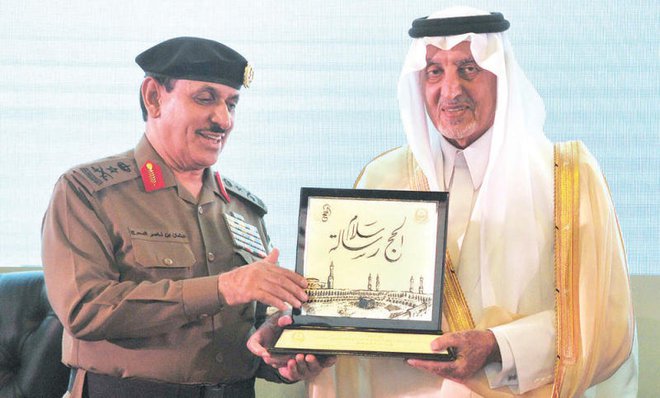
Makkah ready for Haj
A campaign entitled “Pilgrimage is a Message of Peace” was launched under the aegis of Makkah Gov. Prince Khaled Al-Faisal in Makkah on Monday.
The Makkah governorate also announced that a project to develop the holy sites was approved by the Royal Court and that it will be implemented soon after the Makkah Region Development Authority completes its studies alongside the new Makkah plans.
Prince Khaled Al-Faisal thanked Custodian of the Two Holy Mosques King Salman for the great efforts he makes to support and look after Haj issues and pilgrims.
The governor also commended and praised the efforts of the public security members in ensuring peace and security for the guests of Allah the Almighty. He thanked Crown Prince Mohammed bin Naif for his efforts and direction, and his follow-up on the issues of Haj with the help and cooperation of the other government agencies.
He called on citizens who have already performed Haj not to perform the pilgrimage illegally or crowd the holy sites, so that the first-timers can perform the rituals with ease and comfort.
The governor also urged the workers and employees at the holy sites to do their work as best as possible and be role models for others.
Prince Khaled said there is coordination between the Ministry of Haj and Umrah and Saudi embassies to familiarize the relevant authorities about the mission of the campaign, sending a message of peace to the whole world.
For the first time, a system of electronic bracelets is being used during Haj. “The Haj procedures will be wholly electronic during the coming years. We are working to make Makkah and the holy sites smart cities,” said the governor.
Prince Khalid stressed that no one and no party will be allowed to harm this blessed country, especially during this sacred time when the guests of Allah the Almighty perform their holy rituals.
The campaign, “Pilgrimage is a message of peace” aims in its first stage (the reception of pilgrims), to promote the principle of Haj as a message of peace in which all pilgrims, regardless of their nationality and race, are equal in the most spiritual atmosphere."
The second stage is aimed at instilling good ethical values, mainly respecting the directives during the Haj rituals, in pilgrims while the third stage focuses on the personal behavior of Hajis in terms of following regulations and laws.



























